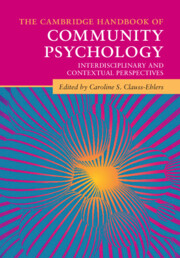Book contents
- The Cambridge Handbook of Community Psychology
- The Cambridge Handbook of Community Psychology
- Copyright page
- Dedication
- Contents
- Figures
- Tables
- Contributors
- Foreword
- Part I Foundational Concepts
- 1 Promoting Change amid Systemic Oppression
- 2 Community Psychology
- 3 Now Would Be a Great Time to Raise Your Voice
- 4 Ethics and Community Psychology
- 5 Defining Wellness across World Cultures
- Part II Research, Assessment, and Program Evaluation
- Part III Community Psychology in Action
- Part IV Where Do We Go from Here?
- Index
- References
1 - Promoting Change amid Systemic Oppression
A Twenty-First-Century Call to Action for Communities and Community Psychologists
from Part I - Foundational Concepts
Published online by Cambridge University Press: 16 December 2021
- The Cambridge Handbook of Community Psychology
- The Cambridge Handbook of Community Psychology
- Copyright page
- Dedication
- Contents
- Figures
- Tables
- Contributors
- Foreword
- Part I Foundational Concepts
- 1 Promoting Change amid Systemic Oppression
- 2 Community Psychology
- 3 Now Would Be a Great Time to Raise Your Voice
- 4 Ethics and Community Psychology
- 5 Defining Wellness across World Cultures
- Part II Research, Assessment, and Program Evaluation
- Part III Community Psychology in Action
- Part IV Where Do We Go from Here?
- Index
- References
Summary
This introductory chapter underscores how the events of 2020 remind us of the importance of community. It discusses how the experience of COVID-19 shows how we are connected across the globe. At the same time, the chapter addresses the differential impact of COVID-19 on communities of color. The chapter talks about how the deaths of Ahmaud Arbery, Breonna Taylor, and George Floyd highlight national and transnational concerns with police brutality and racial profiling. These realities introduce questions such as: What does it mean to belong to a community? How do systemic racism and discrimination interfere with belongingness, access to freedom, and even life and survival? How can communities push macro-level change in the face of systemic oppression? A brief history of community psychology and a review of key competencies are provided. A rationale and overall introduction to the book is included.
Keywords
- Type
- Chapter
- Information
- The Cambridge Handbook of Community PsychologyInterdisciplinary and Contextual Perspectives, pp. 3 - 15Publisher: Cambridge University PressPrint publication year: 2021
References
- 1
- Cited by



